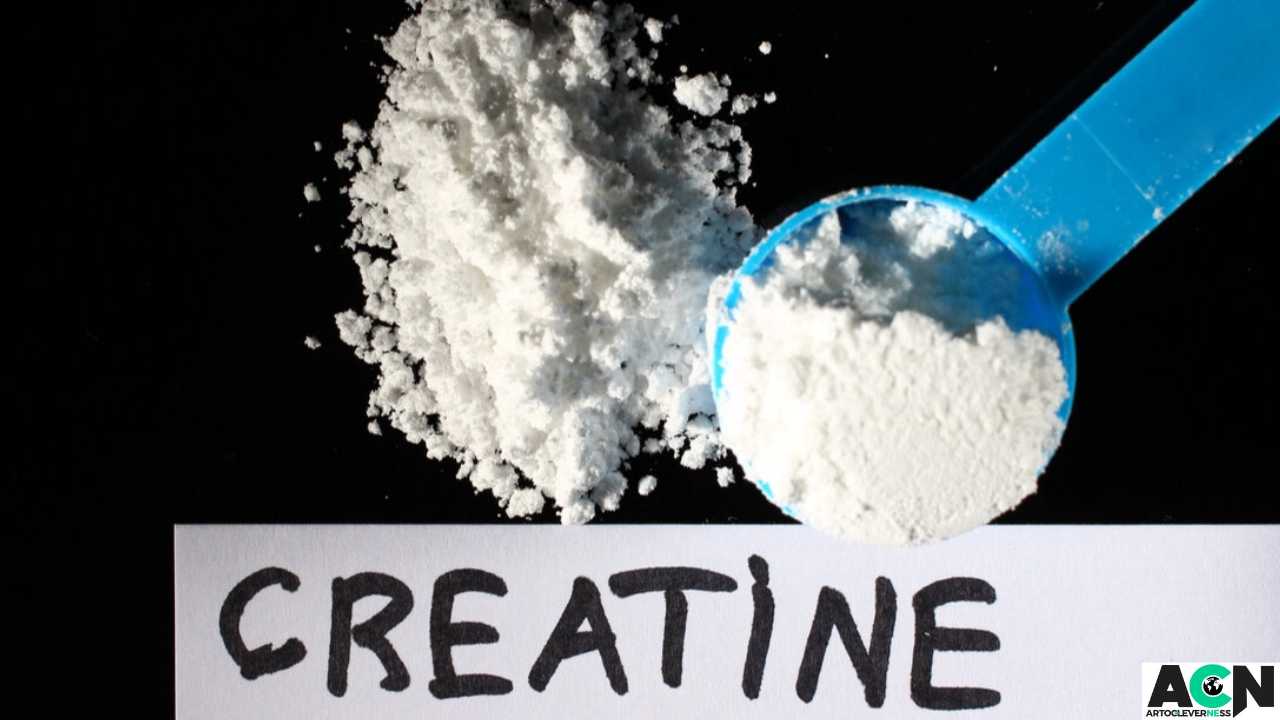Creatine is a widely used supplement that is much acclaimed for its contribution towards muscular development and increased performance in physically demanding activities. People are too curious to know does creatine make you gain weight?
The best approach to managing it is weight gain. Most people may fail to understand that this weight gain comes with muscle gains to a certain level and water retention, not necessarily fat. Hence, there is an apprehension about whether or not Creatine is making you fat while bulking up.
The bad news is that Creatine makes you gain Weight if used in large amounts or over the long term. The good news, however, is that this Weight is muscle weight, not fat.
Understanding this allows one to balance their fitness regime and take advantage of creatine supplements. In this article, you shall discover how to use Creatine optimally with a weight loss or gain program.
Information About Creatine
Creatine is a substance present in the human body’s muscles and brain. It is composed of amino acids and is involved in energy metabolism, particularly muscle energy demand during vigorous activities.
Cyclists, runners, weight lifters, and muscle-building trainers use creatine supplements to enhance their performance and muscle mass.
The involvement of Creatine with muscular bulk and energy metabolism
Creatine also assists in replenishing water within muscle tissues, leading to muscle gain and fuller muscles. It also involves the generation of ATP, which is the form of energy that your cells utilize. This results in enhanced exercise capabilities by increasing your ability to build muscle mass over time.
Muscle Mass Increase
It has also been shown to increase muscle mass, so while exercising and building muscles with the help of Creatine, your total body weight may increase because muscles are denser than fats.
Why does Creatine make you gain Weight?
Creatine only leads to weight gain by retaining fluids in the body. This is important because it challenges the widespread belief that with supplementation, one is bound to gain Weight in one way or another.
Creatine increases water in the muscle cells, making the cells larger and fuller, contributing to an increase in the scale. This weight increase is mostly just ‘fluid retention,’ meaning it is not fat and is more often than not just water.
How muscle growth leads to weight gain?
In addition to water, Creatine will enhance muscle mass through its ability to make workouts more intense and improve muscle repair mechanisms.
In the long run, it will lead to hormone-induced muscle mass gains and will also help contribute to an overall increase in body weight.
Antecedents of Weight Gain from Creatine

They do have to point out that the amount of Weight gained depends on factors like body type, diet, and how many scoops of Creatine are taken regularly, accompanied by the kind of exercise routine.
Water retention in some people may be easily identifiable due to apparent swelling within short periods, while gain in muscle mass may take months to develop.
You will typically gain approximately 10 pounds during the third trimester if you did not gain Weight during the first trimester of pregnancy and were underweight or normal Weight at the start of pregnancy.
You will gain about 11 to 14 pounds of Weight if you were of average Weight at the beginning of pregnancy and gained no weight in the first trimester; you will gain about 7 to 11 pounds of Weight if you were of over-weight
Obesity Induced through Short-Term Weight Gain Vs/Long-Term Weight Gain
For the first week, adding about 1-3 pounds of adipose tissue is possible, depending on one’s water retentiveness.
In the long run, muscle mass increase only adds more Weight, and most of the time, it is considered a boon as it improves the number of muscles developed.
Does Creatine make you gain fat? ’
It is, however, important to note that Creatine itself does not promote fat gain; rather, it helps the muscles gain fat, which will be burned during exercises.
This is because weight gain comprises water and muscle mass acquired during training. More than that, there is no evidence that Creatine causes fat buildup as it does not contain calories and has no direct impact on fats.
Identifying Between Fat Mass and Total Body Water
One should understand that there is a difference in the process of gaining fat and gaining water weight. Creatine will cause some water weight.
Thus, it may make you weigh more on the scale, but this is different from those who are obese; they will put on Weight by taking more calories than using.
Should I Take Creatine during the dieting period?
Consuming creatine supplements during a weight loss program assists in preserving lean muscles and enhancing workout performance, which is helpful for fat loss.
However, the first few weeks of gaining water may hide fat loss, which must be frustrating to those who religiously document their Weight.
The Ratio between Muscle Mass and Losing Weight
Creatine assists in maintaining muscle mass as you lose fat, which positively impacts one’s body, especially in a sculpted look.
That is why when on Creatine in the process of gaining muscles and losing Weight, it is recommended that one takes healthy meals and follows a regular exercise regimen.
How to take Creatine while on Calorie Deficit?
If you are using Creatine while on a low-calorie diet, ensure that you take plenty of water and protein to avoid losing muscle mass. Set goals in terms of weight measurements and how you feel, as you should not exclusively rely on the scale.
Will I Be Able to Lose Weight If I Do Not Retake Creatine?
When you stop taking Creatine, you will lose Weight because there is always some water in your muscles, which you will eliminate.
This does not mean that you will lose your muscles, but the water retention decreases, which can make you feel less muscular.
Possible Ways of Dealing with Weight Fluctuations after Cessation of Creatine Supplements
Indeed, if you stop Creatine taking, you should continue exercising not to lose the muscle mass you gained. The lean mass you lose once you stop taking Creatine is mostly water; therefore, exercising is advisable to maintain your muscles.
Familiarizing With the Fact that Water Weight is Only Temporary
Weight gained from Creatine comes with the supplement, is not fat nor permanent, and will right itself if you decide to stop or if your body has adapted to it.
This Weight is not fat and has to do with where you put your ‘fat’. It is not permanently subtracted from your body composition.
What Are the Negatives of Creatine?

A few side effects of Creatine include stomach upset and bloating, especially when one initiates the loading process.
Fluoxetine is a compound that can cause these symptoms, and drinking a lot of water and dividing the dose in the day can often reduce them.
Stereotypes Associated with Creatine and Its Relationship with Weight
If you do a quick search on Google, you will find thousands of myths surrounding Creatine, including that it leads to fat gain and poses some health risks.
Creatine monohydrate is one of the safest and most researched supplements when used adequately, and contrary to what is believed, it does not lead to fat gain or severe health issues for the majority of users.
Duration of Creatine Effects
The benefits of Creatine, such as increased muscle mass, are permanent if you stay compliant with your training regimen and the muscle mass.
Although the increase in the Weight of water in the muscle cells is an advantage of using Creatine, the Weight will be lost once one stops using the supplement.
Things to Expect When You Decide to Cease Supplementing with Creatine
If you discontinue the use of Creatine, you will realize that the slight increase in the body’s Weight is due to water retention, and you can lose the same if you stop using it.
Still, the muscles you have built using the supplement will be permanently built if you exercise. They are also aware that once the intake of Creatine is stopped, it does not mean the loss of muscles but rather a reduction in the extra water retained in those muscles.
Conclusion
Creatine is a potent supplement with numerous values to promote muscle mass development and improve performance. In most cases, one may gain a little weight while using Creatine, but it is important to note that this Weight mainly consists of water in the muscle tissues and bulk.
The water weight is generally believed to be quickly shed, at least through exercise and, if not, dietary restrictions. In contrast, gaining muscle mass is reasonably permanent unless one decides to cut down muscles by curtailing the number of exercises done and the type of foods consumed.
The only wrong side of Creatine is the issue of putting on some weight, which can be easily overcome through increasing water intake, controlling your diet, and regular exercise. For most people, it seems that creatine can become a godsend if utilized correctly in the specified Weigh.
In general, creatine decides to cease the intake of Creatine-performance-enhancing and muscle-building supplements. Bye is likely to reduce, but failure to train will mean you are not expected to reduce your muscle strength and size.
In general, Creatine stands as one of the best researched and bona fide performance-enhancing and muscle-building supplements. By knowing how it works and how to deal with possible side effects, you can decide whether Creatine will be helpful for your fitness goals.
(FAQs)
Does Creatine Make You Gain Weight?
Indeed, Creatine can cause weight gain, which is primarily healthy since it is both water weight and muscle mass. This increase in Weight may be regarded as a positive development for people who are interested in increasing their strength and muscle tissue development.
Can I Still Lose Some Weight if I Don’t Take Creatine Anymore?
Therefore, if a person decides to stop taking Creatine, he or she will lose some weight, especially water weight. Nevertheless, if you continue exercising your muscles routinely, this does not impact muscle mass.
Does it make you retain water, and how can you avoid it?
Indeed, Weight loss from water retention due to creatine is not permanent but reduces once you stop taking the supplements or have your body adjust to the new supplement.
What are the Disadvantages of Creatine?
The main drawbacks are temporary water accumulation and, consequently, swelling. Creatine is non-toxic to the body when taken in the right proportion, and few side effects are known to occur in the market.
Are men able to gain permanent muscle mass with creatine supplements?
These muscles can be gained permanently from Creatine if the consumer sticks to a good exercise regimen. However, the water weight will reduce if you decide to stop the intake of Creatine.


